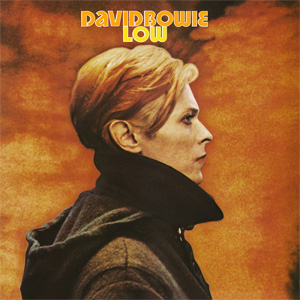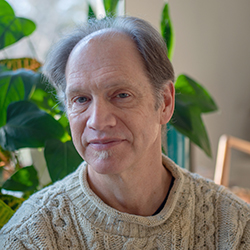
Philip Morris Glass is an American composer and pianist. He is widely regarded as one of the most influential composers of the late 20th century. Glass's work has been associated with minimalism, being built up from repetitive phrases and shifting layers. Glass describes himself as a composer of "music with repetitive structures", which he has helped evolve stylistically.

"Heroes" is the 12th studio album by English musician David Bowie, released on 14 October 1977 through RCA Records. After releasing Low earlier that year, Bowie toured as the keyboardist of his friend and singer Iggy Pop. At the conclusion of the tour, they recorded Pop's second solo album Lust for Life at Hansa Tonstudio in West Berlin before Bowie regrouped there with collaborator Brian Eno and producer Tony Visconti to record "Heroes". It was the second instalment of his "Berlin Trilogy", following Low and preceding Lodger (1979). Of the three albums, it was the only one wholly recorded in Berlin. Much of the same personnel from Low returned for the sessions, augmented by King Crimson guitarist Robert Fripp.

Lodger is the 13th studio album by English musician David Bowie, released on 25 May 1979 through RCA Records. After an eventful year that saw the release of two studio albums, Low and "Heroes", and many other side projects in 1977, Bowie embarked on the Isolar II world tour in 1978. During a break in the tour, Bowie regrouped with collaborator Brian Eno and producer Tony Visconti to record his next album. The final release of the Berlin Trilogy, the album was recorded mainly at Mountain Studios in Montreux, Switzerland, in September 1978. Most of the same personnel from prior releases returned, and future King Crimson guitarist Adrian Belew joined from the tour.

Low is the 11th studio album by the English musician David Bowie, released on 14 January 1977 through RCA Records. After years of drug addiction when living in Los Angeles, Bowie moved to France in 1976 with his friend Iggy Pop to sober up. There, Bowie produced and co-wrote Pop's debut studio album, The Idiot, featuring sounds Bowie would explore on his next record. After completing The Idiot, Bowie began recording the first of three collaborations that became known as the Berlin Trilogy with American producer Tony Visconti and English musician Brian Eno. Sessions began at Hérouville's Château d'Hérouville in September 1976 and ended in October at Hansa Studios in West Berlin, where Bowie and Pop had relocated.
Symphony No. 1 (Low) is a symphony by Philip Glass based on David Bowie's 1977 album Low.
"Warszawa" is a mostly instrumental song by David Bowie and Brian Eno originally released in 1977 on the album Low. The band Joy Division was initially called Warsaw as a reference to this song.

The Berlin Trilogy consists of three studio albums by English musician David Bowie: Low, "Heroes" and Lodger (1979). The trilogy originated following Bowie's move from Los Angeles, California, to Europe to rid himself of worsening drug addiction. Influences included krautrock, the German music genre, and the recent ambient releases of English musician Brian Eno. After cancelling a proposed soundtrack album for The Man Who Fell to Earth, Bowie embarked on the Isolar tour and then moved to Europe. Before work began on the trilogy, Bowie co-wrote and produced Iggy Pop's debut solo album The Idiot, which features a sound similar to that which Bowie would explore in the trilogy. He also collaborated with Pop for his second solo album Lust for Life before recording "Heroes". Both albums were released in 1977.
"Subterraneans" is a song by David Bowie, the closing track of his 1977 album Low. As with most of Side 2, "Subterraneans" is mostly instrumental, with brief, obscure lyrics sung near the song's end.
"Sons of the Silent Age" is a song written by David Bowie in 1977 for the album "Heroes". According to Brian Eno, it was the only song on the album composed prior to the recording sessions, all others being improvised in the Hansa by the Wall studio. Bowie himself indicated that Sons of the Silent Age could at one stage have been the title for the album, rather than "Heroes".
"V-2 Schneider" is a largely instrumental song written by David Bowie in 1977 for the album "Heroes". It was a tribute to Florian Schneider, co-founder of the band Kraftwerk, whom Bowie acknowledged as a significant influence at the time. The title also referenced the V-2 rocket, the first ballistic missile, which had been developed for the German Army during World War II, and whose design played a key role in the American space program.
"Sense of Doubt" is an instrumental piece written by David Bowie in 1977 for the album "Heroes". It was the first of three instrumentals on Side Two of the original vinyl album that segued into one another, preceding "Moss Garden" and "Neuköln".
"Neuköln" is an instrumental piece written by David Bowie and Brian Eno in 1977 for the album "Heroes". It was the last of three consecutive instrumentals on side two of the original vinyl album, following "Sense of Doubt" and "Moss Garden."
Margaret Brouwer is an American composer and composition teacher. She founded the Blue Streak Ensemble chamber music group.

David Bowie Narrates Prokofiev's Peter and the Wolf is a classical music album containing English musician David Bowie's narration of Sergei Prokofiev's 1936 composition Peter and the Wolf. Produced by Jay David Saks, the music is performed by the Philadelphia Orchestra conducted by Eugene Ormandy. Bowie recorded his narration in December 1977 at RCA Studio B in New York City after completing his promotional appearances for his album "Heroes" (1977). The album was released in May 1978 on the RCA Red Seal label. The LP also contained a recording of Benjamin Britten‘s The Young Person's Guide to the Orchestra on the B-side. It reached number 136 on the US Billboard Top LPs & Tape chart. The recording has received positive reviews from critics and Bowie's biographers, with Bowie's appearance garnering praise. It has since been reissued with different artworks.

Mark Gustavson is an American composer of contemporary classical music.
Symphony No. 5 "Requiem, Bardo, Nirmanakaya" is a symphony for chorus and orchestra by the American composer Philip Glass. It was commissioned by the Salzburg Festival, Austria and premiered August 28, 1999 and was conducted by Dennis Russell Davies.
Philip Glass' Symphony No. 2 was commissioned by Brooklyn Academy of Music. It was first performed on October 15, 1994, by the Brooklyn Philharmonic Orchestra, conducted by Dennis Russell Davies.

"Sue " is a song by English musician David Bowie released on 17 November 2014 as the lead single from the 2014 compilation album Nothing Has Changed. Co-produced by Bowie and longtime collaborator Tony Visconti, the song originated after the two saw bandleader Maria Schneider perform with her orchestra in May 2014. They began collaborating on Bowie's first major project since The Next Day (2013). Following workshop sessions in mid-June, the track was recorded officially at Avatar Studios in New York on 24 July 2014, with contributions from Schneider's orchestra.
Symphony No. 12 (Lodger) is the twelfth symphony by the American composer Philip Glass. The work was commissioned by the Los Angeles Philharmonic and premiered January 10, 2019, with John Adams conducting the LA Phil at the Walt Disney Concert Hall in Los Angeles. The European premiere followed on May 9, 2019 with a performance by the London Contemporary Orchestra at Southbank Centre.





